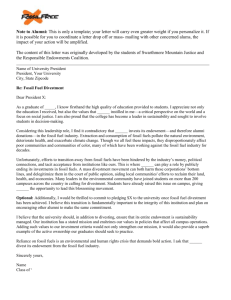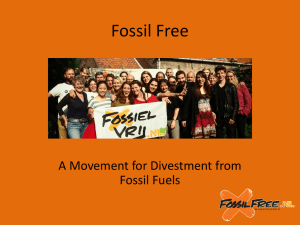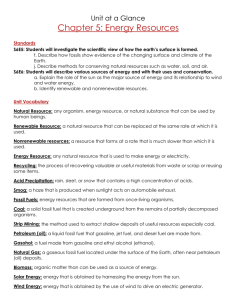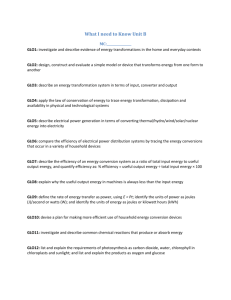Why Divestment: What the Campaign to Divest from Fossil Fuel
advertisement
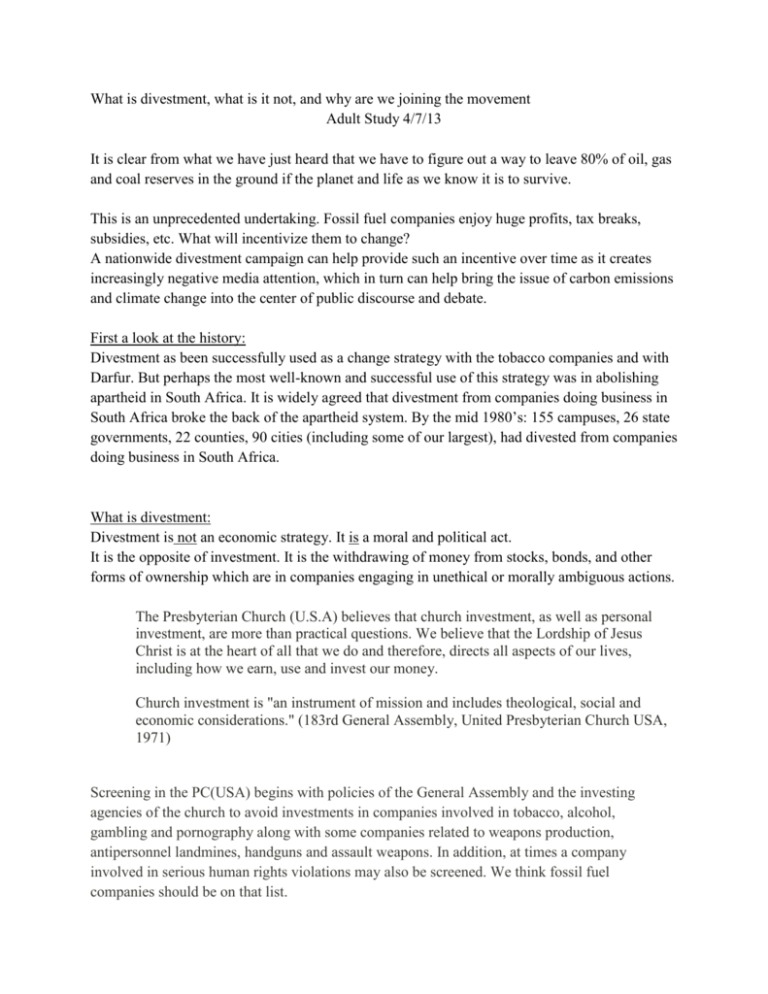
What is divestment, what is it not, and why are we joining the movement Adult Study 4/7/13 It is clear from what we have just heard that we have to figure out a way to leave 80% of oil, gas and coal reserves in the ground if the planet and life as we know it is to survive. This is an unprecedented undertaking. Fossil fuel companies enjoy huge profits, tax breaks, subsidies, etc. What will incentivize them to change? A nationwide divestment campaign can help provide such an incentive over time as it creates increasingly negative media attention, which in turn can help bring the issue of carbon emissions and climate change into the center of public discourse and debate. First a look at the history: Divestment as been successfully used as a change strategy with the tobacco companies and with Darfur. But perhaps the most well-known and successful use of this strategy was in abolishing apartheid in South Africa. It is widely agreed that divestment from companies doing business in South Africa broke the back of the apartheid system. By the mid 1980’s: 155 campuses, 26 state governments, 22 counties, 90 cities (including some of our largest), had divested from companies doing business in South Africa. What is divestment: Divestment is not an economic strategy. It is a moral and political act. It is the opposite of investment. It is the withdrawing of money from stocks, bonds, and other forms of ownership which are in companies engaging in unethical or morally ambiguous actions. The Presbyterian Church (U.S.A) believes that church investment, as well as personal investment, are more than practical questions. We believe that the Lordship of Jesus Christ is at the heart of all that we do and therefore, directs all aspects of our lives, including how we earn, use and invest our money. Church investment is "an instrument of mission and includes theological, social and economic considerations." (183rd General Assembly, United Presbyterian Church USA, 1971) Screening in the PC(USA) begins with policies of the General Assembly and the investing agencies of the church to avoid investments in companies involved in tobacco, alcohol, gambling and pornography along with some companies related to weapons production, antipersonnel landmines, handguns and assault weapons. In addition, at times a company involved in serious human rights violations may also be screened. We think fossil fuel companies should be on that list. What divestment is not: Its purpose is not to put the fossil fuel companies out of business. It is not that we have to give up our cars or quit heating our homes. Divestment is not about giving up use of fossil fuel. What it is: It is about reducing our dependency on fossil fuel. We can’t stop global warming one pipeline at a time. So what can we do? The fossil fuel divestment campaign is about creating a movement which can educate the broader public about the increasing amount of CO2 in the atmosphere and its impact on global warming. As a divestment campaign grows, there is strength in numbers, which ultimately can bring sufficient negative publicity to hurt the bottom line of the energy companies which are responsible for most of these emissions. Primarily, divestment from fossil fuel companies is about creating a movement which will bring about change in the way they do business. They need to become energy companies focusing on renewable sources of energy. Possible results of such negative attention could be lightening of the hammerlock that the fossil fuel industry has on Washington opening up a political space for change. We have the solutions necessary to prevent climate catastrophe. Each day, the fossil fuel industry spends ½ million dollarss to block these solutions. Such as: -Carbon taxes -End of subsidies to fossil fuel -Other legislation to require more energy efficient buildings, cars,etc -Reduction in the ½ million $’s/day that the oil industry spends lobbying Congress -Requiring fossil fuel companies to pay for the externalities of their business, e.g. cleaning up dirty air. Why divest? Divestment is first and foremost a prophetic act. Just as faith leaders used their prophetic voices in abolishing slavery, in the civil rights movement, and in the anti Vietnam movement so we must take a prophetic role in addressing the destruction of creation. The choice to divest is an act of integrity. Wrecking creation is a sin. So we remove our investment in that. Divestment addresses a profound justice issue. Climate change has a disproportionate impact on those living in poverty and in least developed countries. Those people are also least responsible for contributing to greenhouse gas emission. In addition, it will produce several practical outcomes: • it will drive public awareness of the incalculable damage being done by the fossil fuel industry as it generates huge immediate profits in exchange for an uninhabitable future; • it will build public recognition of the urgent need to drastically and rapidly reduce humanity’s dependence on fossil fuels; • it will call widespread attention to the consequences of continuing a “business as usual” approach to extracting, marketing and burning fossil fuel; • it will lead to inspiring an urgent, accelerated and popular commitment to leave untapped 80% of the known carbon reserves,9 while developing renewable energy resources capable of meeting humanity’s needs. Thus making it possible that life as we have known it might continue on God’s good earth. • What are we asking the Presbyterian Church to do? 1. Freeze new investments in fossil fuel companies 2. Divest from direct ownership and commingled funds of fossil fuel companies over the next 5 years. 3. The Presbyterian church in 2006 passed a resolution saying we have a Christian mandate to care for creation by “acting now and acting boldly to lead the way in reducing our energy usage”.It urged “all Prebyterians to make a bold witness by aspiring to live carbon neutral lives. “ Summary This is a lot to ask in a hurry and hurry we must. The need is urgent to arrest the climate change that is going on. To quote Bill McKibbon “wrecking the planet is their business model.” Is it their intent – no. Is it the consequence—yes. Are these evil people – no. Are these morally and ethically bad decisions—yes. Fossil fuel companies have to become energy companies focusing on developing and implementing renewable energy sources. BP and Shell both had alternative energy divisions which have been shut down as it was more profitable to focus on their “core business”. It reminds me of the auto industry in the 1970’s. The writing was on the wall that they needed to be developing more fuel efficient vehicles. They ignored this reality and continued making SUV’s and large cars and trucks. Forty years and several bankruptcies later, hybrids are rolling off the production lines in Detroit. We don’t have the luxury of waiting forty years. The irreversible damage will be done. We have to create an incentive to change now. Divestment was the incentive to bring down apartheid. We believe divestment can be the incentive to change the direction of fossil fuel companies toward renewable sources of energy and a sustainable planet.
